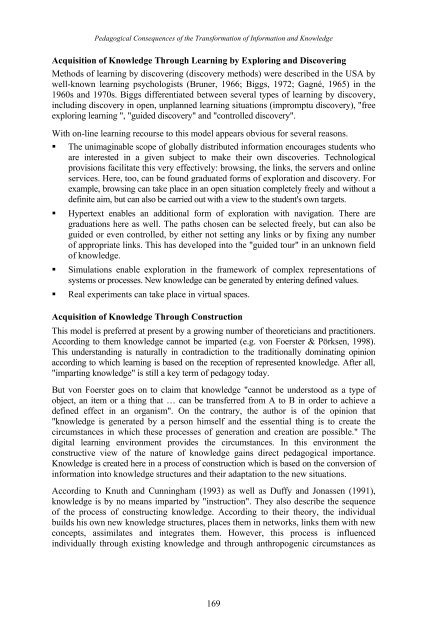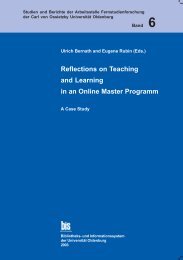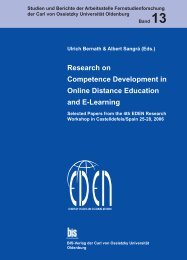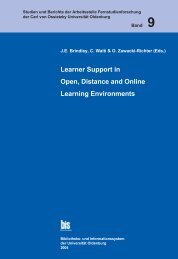Distance Education in Transition - Master of Distance Education ...
Distance Education in Transition - Master of Distance Education ...
Distance Education in Transition - Master of Distance Education ...
Create successful ePaper yourself
Turn your PDF publications into a flip-book with our unique Google optimized e-Paper software.
Pedagogical Consequences <strong>of</strong> the Transformation <strong>of</strong> Information and Knowledge<br />
Acquisition <strong>of</strong> Knowledge Through Learn<strong>in</strong>g by Explor<strong>in</strong>g and Discover<strong>in</strong>g<br />
Methods <strong>of</strong> learn<strong>in</strong>g by discover<strong>in</strong>g (discovery methods) were described <strong>in</strong> the USA by<br />
well-known learn<strong>in</strong>g psychologists (Bruner, 1966; Biggs, 1972; Gagné, 1965) <strong>in</strong> the<br />
1960s and 1970s. Biggs differentiated between several types <strong>of</strong> learn<strong>in</strong>g by discovery,<br />
<strong>in</strong>clud<strong>in</strong>g discovery <strong>in</strong> open, unplanned learn<strong>in</strong>g situations (impromptu discovery), "free<br />
explor<strong>in</strong>g learn<strong>in</strong>g ", "guided discovery" and "controlled discovery".<br />
With on-l<strong>in</strong>e learn<strong>in</strong>g recourse to this model appears obvious for several reasons.<br />
� The unimag<strong>in</strong>able scope <strong>of</strong> globally distributed <strong>in</strong>formation encourages students who<br />
are <strong>in</strong>terested <strong>in</strong> a given subject to make their own discoveries. Technological<br />
provisions facilitate this very effectively: brows<strong>in</strong>g, the l<strong>in</strong>ks, the servers and onl<strong>in</strong>e<br />
services. Here, too, can be found graduated forms <strong>of</strong> exploration and discovery. For<br />
example, brows<strong>in</strong>g can take place <strong>in</strong> an open situation completely freely and without a<br />
def<strong>in</strong>ite aim, but can also be carried out with a view to the student's own targets.<br />
� Hypertext enables an additional form <strong>of</strong> exploration with navigation. There are<br />
graduations here as well. The paths chosen can be selected freely, but can also be<br />
guided or even controlled, by either not sett<strong>in</strong>g any l<strong>in</strong>ks or by fix<strong>in</strong>g any number<br />
<strong>of</strong> appropriate l<strong>in</strong>ks. This has developed <strong>in</strong>to the "guided tour" <strong>in</strong> an unknown field<br />
<strong>of</strong> knowledge.<br />
� Simulations enable exploration <strong>in</strong> the framework <strong>of</strong> complex representations <strong>of</strong><br />
systems or processes. New knowledge can be generated by enter<strong>in</strong>g def<strong>in</strong>ed values.<br />
� Real experiments can take place <strong>in</strong> virtual spaces.<br />
Acquisition <strong>of</strong> Knowledge Through Construction<br />
This model is preferred at present by a grow<strong>in</strong>g number <strong>of</strong> theoreticians and practitioners.<br />
Accord<strong>in</strong>g to them knowledge cannot be imparted (e.g. von Foerster & Pörksen, 1998).<br />
This understand<strong>in</strong>g is naturally <strong>in</strong> contradiction to the traditionally dom<strong>in</strong>at<strong>in</strong>g op<strong>in</strong>ion<br />
accord<strong>in</strong>g to which learn<strong>in</strong>g is based on the reception <strong>of</strong> represented knowledge. After all,<br />
"impart<strong>in</strong>g knowledge" is still a key term <strong>of</strong> pedagogy today.<br />
But von Foerster goes on to claim that knowledge "cannot be understood as a type <strong>of</strong><br />
object, an item or a th<strong>in</strong>g that … can be transferred from A to B <strong>in</strong> order to achieve a<br />
def<strong>in</strong>ed effect <strong>in</strong> an organism". On the contrary, the author is <strong>of</strong> the op<strong>in</strong>ion that<br />
"knowledge is generated by a person himself and the essential th<strong>in</strong>g is to create the<br />
circumstances <strong>in</strong> which these processes <strong>of</strong> generation and creation are possible." The<br />
digital learn<strong>in</strong>g environment provides the circumstances. In this environment the<br />
constructive view <strong>of</strong> the nature <strong>of</strong> knowledge ga<strong>in</strong>s direct pedagogical importance.<br />
Knowledge is created here <strong>in</strong> a process <strong>of</strong> construction which is based on the conversion <strong>of</strong><br />
<strong>in</strong>formation <strong>in</strong>to knowledge structures and their adaptation to the new situations.<br />
Accord<strong>in</strong>g to Knuth and Cunn<strong>in</strong>gham (1993) as well as Duffy and Jonassen (1991),<br />
knowledge is by no means imparted by "<strong>in</strong>struction". They also describe the sequence<br />
<strong>of</strong> the process <strong>of</strong> construct<strong>in</strong>g knowledge. Accord<strong>in</strong>g to their theory, the <strong>in</strong>dividual<br />
builds his own new knowledge structures, places them <strong>in</strong> networks, l<strong>in</strong>ks them with new<br />
concepts, assimilates and <strong>in</strong>tegrates them. However, this process is <strong>in</strong>fluenced<br />
<strong>in</strong>dividually through exist<strong>in</strong>g knowledge and through anthropogenic circumstances as<br />
169





